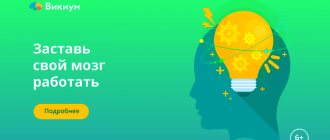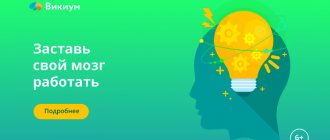Published: October 4, 2021 Category: Skills Author: Lyudmila Redkina
Hello everyone, friends! Lyudmila is with you.
The century in which we live has been declared the century of psychology. And we are witnesses to how quickly technologies for influencing the human psyche are developing, how the capabilities of the brain are being studied, how methods for the rapid development of cognitive processes are being introduced. At the same time, many note a decrease in brain activity from an overdose of information, stress and other harmful factors.
In this article, I will explain in simple words what human cognitive abilities are, how they are formed, and what needs to be done to prevent them from deteriorating.
- What are cognitive abilities: definition
- Types of cognitive abilities Memory
- Thinking
- Attention
- Speech
- Perception
- Imagination
- Nutrition
- Courses
What are cognitive abilities: definition
Cognitive abilities are the work of mental processes that are necessary to perceive the world around us and adapt to it. With their help, a person receives information, processes it, remembers, stores, reproduces and sorts it.
The list of cognitive abilities is simple. It includes:
- memory,
- attention,
- thinking,
- perception,
- speech,
- imagination.
This is the structure of a person’s cognitive abilities.
We are pleased to communicate with a competent person who clearly and clearly expresses his thoughts, remembers small details, knows how to fantasize, concentrate, draw conclusions, etc. This is all the work of cognitive functions. And this means that we enjoy communicating and doing things in common with people whose cognitive functions work at their best.
I want to say that modern society makes very difficult demands on people. If you have become a little more popular, then be kind enough to express yourself competently, clearly and clearly express your thoughts and do everything that I listed earlier. Just about 100 years ago, a person lived for himself and did not know grief, worked with a chopper in the garden and did not think about how to develop his brain.
But in the 21st century, we know that it is our developed cognitive processes that make us successful. And their level determines how respected we are in society, how much we can earn, what useful contacts we can make, etc.
What are cognitive processes?
Every day the human brain has to process a huge amount of information, in which mental processes help it.
Thanks to cognition, we have the ability to understand the world around us.
Find out what awaits you today - Horoscope for today for all zodiac signs
Due to numerous requests from subscribers, we have prepared an accurate horoscope application for mobile phones. Forecasts will arrive for your zodiac sign every morning - it's impossible to miss! Download for free: Daily Horoscope 2020 (available on Android)
Let's look at a specific example. You are sitting and watching a movie, enthusiastically delving into the essence of what is happening, when suddenly you hear a strange sound from the street, like an explosion. Will you continue watching TV as if nothing had happened, or will you run to the window to see what happened? Naturally, the second option.
Your brain will instantly switch to new information in order to find out if it poses any threat to you. Cognitive processes are responsible for this.
Thanks to harmonious mental processes, a person is able to adequately assess what is happening, reacting correctly to it. This allows you to correctly adapt to different situations.
The mental process can be either joint or occur independently.
Who studies cognitive processes? Linguists, sociologists, neurologists, anthropologists and philosophers. Psychology has a separate branch for the study of these processes, called cognitive psychology.
Types of cognitive abilities
We have already become acquainted with the list of mental processes. Now let’s take a closer look at these concepts, characterize the processes, and consider the “golden” abilities that open the way to life for us.
Memory
This is a mental process that helps us remember, reproduce and retain information.
It is possible and necessary to develop memory. We teach preschool children rhymes, tell them fairy tales to help them memorize, and help them remember important actions in life.
As adults, just everyday memory is no longer suitable for success. Mnemonics and clear memorization of dates, faces, and numbers are important here. It is this skill that gives us the opportunity to be a good employee, interlocutor, and leader. It is good and high-quality memorization that opens up opportunities for us.
I recommend that you familiarize yourself with a selection of courses on memory development.
Thinking
It is a mental process for adapting to the world. It helps us perceive and process everything that happens around us.
The level of development of thinking is directly proportional to our effectiveness at work and in our personal lives. Watch courses on developing thinking.
Thinking helps us quickly respond to changes, analyze current events and make appropriate decisions. Our intelligence depends on this process, which is very important for our productivity.
Logical thinking is especially valued. It protects us from mistakes and helps us make quick and correct decisions. Find a complete classification of types of thinking on our blog.
But sometimes the development of logic and emotional intelligence can lead to cognitive dissonance, that is, to an awareness of the paradox of this world. For example, we understand that children with living parents should not be in shelters, but this happens. We understand that there should be peace and tranquility in a family, but there are constant squabbles and people feel uncomfortable.
Attention
The mental process that “chooses” what to perceive, what to process, and what specifically needs to be remembered.
Attention is a very useful thing. Even with intact memory, a child may not be able to reproduce anything at all. And many parents stuff him with pills, force him to learn poetry to develop his memory, but the problem is attention.
Find a complete classification of types of attention on our blog.
Success in work depends on concentration, switchability, and stability of attention. The cognitive ability to maintain attention is not easy. But it pays off in efficiency and the opportunity to occupy leadership positions.
I recommend studying our article on how to develop attention, as well as taking a look at the selection of courses on developing attention.
Speech
It is unique to humans and helps them adapt to society, exchange information and perform other functions. Speech distinguishes us from animals and gives us an advantage.
A person's verbal abilities depend on the work of thinking. Speech is very closely related to the work of other mental functions. How does it relate to cognitive abilities?
It influences a person’s understanding of the world through learning to communicate in their native language. Speech allows us to learn a lot, receive information, interact with others and organize our lives through dialogue with ourselves.
The correct formulation of thoughts, oratory capabilities, and rhetoric enable a person to become respected in his environment. And if he has also mastered the ability to tell stories and joke, then he will generally become the life of the party.
Perception
A process that helps to reflect holistic images of objects in the mind.
This process helps a person perceive everything that happens around him through the senses. Perception gives us information about the world around us: smells, colors, materials, etc.
Imagination
A person’s ability to create something new, generate ideas based on experience.
This is such a creative mental process. It is very related to creativity. And in the age of rapid development of new technologies, creativity is an extremely sought-after personality characteristic. Therefore, imagination, that is, a person’s ability to imagine, invent, reproduce images, also refers to cognitive abilities.
When and why did the theory of cognitive dissonance emerge?
Leon Festinger
In 1957, American psychologist and expert in the field of psychology of thought regulation Leon Festinger, taking as a basis Heider's theory of structural balance and Lewin's field theory, formulated the theory of cognitive dissonance. The impetus for the creation of the theory was the rumors that spread after the earthquake in one of the American states. Festinger, wanting to explain both the rumors and the sincere belief in them by many US residents, made the following conclusion: people always strive for internal balance between personal motives that determine their behavior and information received from outside.
Before Leon Festinger, virtually no scientists had studied the motivational process and its cognitive components at a serious level. He was able to prove that any person strives to make his perception of the real world coherent and orderly.
Every person wants not only to know inner harmony, but also to preserve it. All views and attitudes that are inherent in a particular person are combined into a system, all the elements of which are consistent with each other. Almost similar agreement exists between what a person believes and how he acts.
Festinger formulated two hypotheses of his theory. The first hypothesis states that a person experiencing cognitive dissonance will do everything possible to reduce the level of incongruity between conflicting attitudes. Since the individual does not want to experience mental discomfort, he strives as quickly as possible to ensure that correspondence (consonance) arises between conflicting attitudes.
The second hypothesis is as follows: “A person experiencing cognitive dissonance not only strives to establish correspondence between conflicting attitudes, but in the future will also begin to actively avoid information and life situations that may cause such a state or increase its level.”
The influence of cognitive functions on human life
I've already touched a little on how general cognitive abilities affect our lives. I would like to note that our ENTIRE life, our freedom, depends on these functions. After all, what is the worst thing for a person? Lose freedom and the ability to communicate.
The work of the brain provides us with self-care, communication, respect for others, good earnings, effective and rapid development of professional competencies, the ability to present oneself in society, the ability to assess one’s condition and the environment, the ability to solve problems and not create them.
What do we see in older people with reduced cognitive abilities? They exhibit forgetfulness, lack of concentration, have difficulty formulating thoughts, and in severe cases have difficulty understanding where they are. This is scary. But what’s even worse is that violations of these functions also occur in young people.
Cognitive impairment in older people
Therefore, cognitive functions give us the main thing - a feeling of freedom and independence, the ability to make decisions and bear responsibility for them.
The cognitive ability of emotional intelligence is also very important in life. It is thanks to her that we can understand other people, sympathize with them, and be a good conversationalist and friend. This helps us not to be alone.
To avoid suffering from low brain productivity in old age, take care of its functioning today.
Diagnostic tests
Assessing the level of cognitive functions is very important for a person, especially when applying for a job. But it wouldn’t hurt to check for yourself which mental processes are working well for you and which ones need to be “tightened up.”
I will offer you several tests to determine the level of mental functions.
The cognitive abilities test is a 30–40 minute diagnostic program that evaluates the functioning of memory, attention, and thinking. Based on the test results, you will see your psychological profile. It consists of cognitive and personal sections. The following will be displayed:
- ability to concentrate and switch attention;
- development of verbal, non-verbal logic;
- the work of visual-figurative thinking and verbal-logical memory;
- short-term and long-term memorization;
- type of thinking and level of creativity;
- personality type and your characteristics;
- leading style of activity;
- ability for self-regulation.
The cost of diagnostics is 990 rubles.
The Battery of General Cognitive Tests is a professional 30-40 minute technique for diagnosing brain function and increasing its productivity. A neuropsychological test will show your strengths and weaknesses, how attention, memory, and thinking work.
This provides valuable information about your level of development. The test also shows whether there are cognitive impairments. After testing, you will see a full report showing your neuropsychological profile.
Diagnostic cost is $49.99.
The cognitive ability test is a short test consisting of only 5 questions. Tests concentration, analysis and logical thinking. You will see the level of development of mental processes. The test is free.
You can also test this area with separate thematic tests. For example, tests to test memory, thinking, intelligence, emotional intelligence, attention.
If you're a self-teacher and want to take even more tests, check out our selection of the 13 best online cognitive ability tests.
The main causes of cognitive dissonance
There are many reasons why cognitive dissonance occurs. Let's look at the most popular and widespread of them.
A person can plunge into a state of cognitive dissonance when there is a discrepancy between concepts and ideas that have a strong influence on him when making certain decisions. This is the first and most common cause of internal conflict.
The second reason is the discrepancy that arises between the life beliefs of an individual and the generally accepted norms that guide society or people of a certain circle.
The third reason is the spirit of contradiction. This phenomenon occurs when a person does not want to obey generally accepted ethical and cultural norms. The situation can become heated if these standards do not comply with the law.
The fourth reason is inconsistency, which occurs when information obtained as a result of a certain life experience contradicts new life situations or conditions.
Recommendations for cognitive support
In addition to development, which we will talk about a little later, it is important to preserve the abilities that were originally given to us to think, remember and concentrate.
All my recommendations apply to adults, but they will also be useful for children, since in childhood the psyche is plastic and is just developing, so it is very important to protect it from harmful influences.
Nutrition
There has been a lot of talk about healthy eating lately. And for good reason. After all, all kinds of dyes, products with GMOs and preservatives, taste stabilizers affect the chemical composition of our body. In addition, fatty foods literally kill our brain, making it lazy and inert.
Therefore, my dears, watch your diet, do not eat at night, drink 2 glasses of water in the morning and try to eat natural plant foods.
Dream
Sleep especially affects cognitive abilities. I experienced this myself: when I didn’t get enough sleep for a long time, I noticed that I was confusing the words in my speech and forgetting something. So, friends, don't joke with your sleep. Our brain needs time to recover.
During sleep, the brain does not sleep. It analyzes and organizes all the information received during the day. Give him the opportunity to do this. Give yourself sleep days, go to bed one day and wake up the next. Try to sleep at least 6 hours a day, preferably 8.
“No” to bad habits
It has long been proven that alcohol, nicotine and drugs (even mild ones, weed and energy stimulants too) have a negative effect on the brain. Consciousness narrows, its state changes - the person behaves inappropriately. What kind of development are we talking about... Teenagers especially should not “joke” with harmful substances! Let's start with the fact that this is poison, and they are still children.
I would also call eating late, the desire to sleep longer and move less, a bad habit. All this negatively affects the state of our brain, its functioning and the functioning of cognitive processes. It is quite possible that the habit of waking up late will lead to a decrease in reaction speed and memory. Waking up early stimulates the proper functioning of the main computer, so everything is fine in the cognitive sphere.
Motivation
Try to motivate yourself to do different things, fill your brain with good stimuli. For example, do a good deed and receive gratitude. Go to a symphony concert - get emotions and replenish the stock of images in your imagination. Sit with a friend in a cafe, go to a shooting range with a friend - these are good incentives that will motivate you to do something good.
To motivate yourself to study, work, and live brightly, watch films, read useful books, learn the success stories of famous people.
Rest
Each of us has our own resource. These are the limited capabilities of our brain that need to be protected.
If you endlessly sit in different groups on Viber, Telegram, view unnecessary stories on Instagram or Facebook, do not be surprised by the loss of concentration, decrease in memory and speed of reactions. Such “gatherings” will not lead to good.
We are exposed to a barrage of unnecessary information, and it wastes our brain resources. Sort the information, try to limit the flow of “dirt” into your brain as much as possible. Get out into nature more often. If this is not possible, listen to the music of nature: the cry of dolphins, birdsong, the sound of the sea, the wind. After all, the influence of music on mental functions is enormous.
No stress
And at this point it's time to laugh! "How?" - you ask. Indeed, it is impossible to completely protect yourself from stress. We encounter people, circumstances and news, which in itself is stressful. Please note that not only, for example, speech, but all cognitive abilities will suffer from psycho-emotional stress.
Your task and responsibility is to avoid stress as much as possible. To do this, you can exercise, get away from toxic people, practice positive thinking and autogenic training.
Autogenic training for stress relief
How to develop cognitive abilities
There are many ways and techniques to develop cognitive abilities in both children and adults. Let's consider each of them separately.
Courses
There are great programs that can help improve a person's cognitive abilities. Let me introduce you to some of them.
Development of thinking - course on the Vikium platform. Consists of 11 lessons. Includes a program for developing thinking, theoretical video lectures, practical tasks for development, and simulators. You can:
- improve analytical skills;
- speed up thinking;
- think critically;
- learn to make unconventional decisions.
The cost of the course is 990 rubles.
Developing attention is a useful online course on the Vikium platform. Program structure: 15 lessons, 11 simulators, audio materials, individual development program, a set of thematic exercises.
The course will help:
- it is better to concentrate, switch attention from one object to another;
- be able to focus on tasks and highlight the main thing;
- improve control over your activities;
- get rid of small mistakes that arise due to absent-mindedness.
The cost of training is 990 rubles.
Mnemonics – online course from the Vikium platform. Consists of 15 lessons, practical exercises, 7 simulators, memorization techniques, introductory and final tests to assess memory development.
The course program is aimed at:
- mastering mnemonics and their use in life;
- remembering the necessary information in any quantity;
- accelerated learning of foreign languages;
- quick memorization of poems;
- retaining a large amount of information in memory for a long time;
- effective training.
The cost of training is 990 rubles.
Exercise equipment
There are a large number of simulators on the Internet aimed at training cognitive abilities.
Training your memory:
- Remember the order - training working memory, attention, memorization. You will learn to group and structure information.
- Comparison from memory – training of verbal memory and attention. Develops imaginative thinking and flexibility in a playful way.
- Diamonds – improving the speed of memorization, developing the volume and accuracy of memory.
- Pathfinder – memory and attention training. This machine is based on the Corsi visuospatial test. You need to remember the position of the elements in the squares.
We train attention:
- Airport – improves attention switching, develops voluntary attention and improves concentration.
- Schulte tables - helps develop stability of attention, improves its volume.
- Paired associations – improves concentration and distribution of attention, develops associative thinking.
Train your thinking:
- Unique - for training imaginative thinking, non-verbal logic, attentiveness is also important here.
- Fruit mathematics - effectively improves logic and improves voluntary attention.
All simulators are interconnected. Not just for memory or thinking. After all, all cognitive processes overlap and complement each other, so it is important to develop them in a complex manner. Exercise machines are a good help for this. By developing one thing, you affect other processes.
Exercises
But exercises can develop both a specific type of mental process and all together. For example, if you need to increase your level of creative thinking, there is a tool for this.
Connect 9 dots with four segments. You cannot lift the pen from the paper. Each point is crossed by a line only once.
The development of logical thinking is excellent with the help of the following exercise. There can be many such variations with numbers.
Listing number sequences:
- increasing by 2 and decreasing by 2, example: 2 – 100, 4 – 98, …, 8 – 94, …, 98 – 4, 100 – 2;
- increasing and decreasing by 3: 3 – 97, 6 – 94, etc.;
- increasing by 4, decreasing by 5: 4 – 100, 8 – 95, etc.
The following exercise perfectly develops voluntary memory in children and adults. For adults there may be other word options.
10 words are read, it is important to reproduce them in the same order: morning, silver, child, river, north, up, cabbage, glass, school, boot.
The “Number Series” exercise is well suited for developing attention and memory.
A series of numbers is given: 3, 5, 4, 7, 8, 10, 15. You need to look at them carefully for 30 seconds. Then the second person asks questions:
- What is the number to the right of 7?
- What number is between 4 and 8?
- What numbers add up to 7?
- What number do you get if you add the last three numbers?
Games
In a playful way it is easier to learn, remember and develop something. Therefore, it is easier to develop different types of cognitive processes through play. Cognitive stimulation through games is beneficial at any age. How will we play?
Examples of games:
- Try to get home in a new way. To do this, consider a different route. For example, walk along a parallel street, on the back side of the house, take a shortcut, don’t shorten it, etc. But for a child, there can be no better return home if the entire path is reinforced with visual images, for example, memorizing strange trees, holes along the way and so on.
- Play chess! This is an excellent development of cognitive functions.
- Play checkers! They also develop logic, memory, and attention.
- Sudoku and crossword puzzles are good for brain development.
- Train your memory by memorizing phone numbers. For example, you need to call, they dictated a number to you, you don’t write it down, but try to remember it.
Some more online games:
- Light matrices – develops attention span, concentration and stability.
- Finding a coin - develops spatial and visual memory, increases its volume.
- Visual geometry – develops speed of thinking, logic, creativity.
Books
The benefits of reading books are now being talked about again. I myself have encountered a problem: most primary schoolchildren hate reading! Hence the low academic performance and sheer stupidity in behavior.
It is important to read books, you need to read books! With their help, you can perfectly “work” on your cognitive functions.
I recommend the following books:
- John Medina, Brain Rules. What you and your children should know about the brain”
- Arthur Dumchev “Remember everything”
- Lee LeFever “The Art of Explaining”
- Carol Dweck "Flexible Mind"
- Peter Hollins, How to Trick the Brain. Neurodiscipline at your fingertips”
Ways to improve
Cognitive development can be improved and trained throughout your life. To do this you need:
- Take care of health, which means a lot and is directly related to cognitive processes;
- Use technological advances such as intelligence games. They allow brain testing;
- Celebrate your successes;
- Develop critical thinking;
- Read.
All the processes described can indeed be significantly improved, and this is not too difficult to achieve with proper attention and practice.
Declining factors
But not everything is as rosy as we would like. Our brain has a certain resource that we waste thoughtlessly.
What are cognitive distortions and how to deal with them? For example:
- The tendency of people to explain the behavior of others only by personal qualities, without taking into account circumstances and situations.
- The tendency to select only that information that is beneficial in the explanation, discrediting information that contradicts a certain opinion.
- The tendency to overestimate the likelihood of a good outcome.
- The tendency to argue for exactly what is believed, regardless of the falsity or truth of the belief.
- The tendency to describe a situation very narrowly, to present it in a light favorable to oneself.
- The tendency to underestimate the emotions of others (“I already knew that!”), making predictable what was difficult to predict.
These problems are not organic. But I communicated with such people, and it is very difficult with them. It feels like there is an indestructible wall in front of you. Although they may feel very comfortable in their beliefs. Such distortions are worked through in psychotherapy.
There are also factors that reduce the functioning of the cognitive sphere and the disorders occurring in it:
- brain diseases, infectious diseases;
- “clogging” of the main “computer”;
- lack of a properly organized way of life;
- prolonged multitasking mode, due to which the ability to reason soberly, think, and remember is lost;
- constant noise around a person;
- lack of rest.
Functional diagram of the cognitive process
Long-term memory - what does it mean in psychology, how to improve it
This scheme is used to specify the cognitive process and consists of the following blocks:
- Initial information analysis, that is, the receptor area;
- That which concerns perception: hearing, sight, smell, taste, and so on;
- Memory is like a storage facility, which is quite complex. It contains knowledge and information;
- The area of representation. This is where the synthesis of perception occurs.









